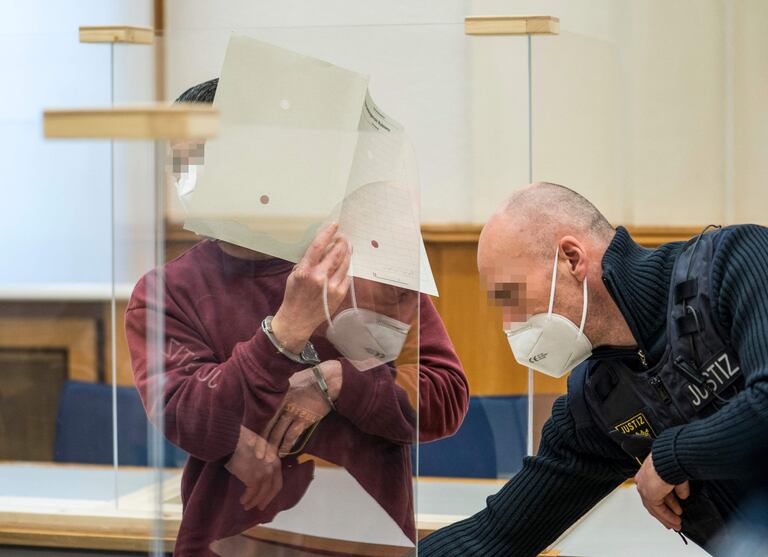The defendant Eyad al Gharib, during the court hearing, this Wednesday in Koblenz.THOMAS LOHNES / AFP
The German justice sentenced a former member of the Syrian secret services to four and a half years in prison on Wednesday, in a historic process because it is the first trial held in the world for the crimes of the regime of President Bashar al-Assad.
Eyad Alghareib, 44, worked guarding dissidents on the bus ride to Prison 251 in Damascus, where prisoners were routinely subjected to torture.
The High Court of Koblenz, in the west of the country, considers Alghareib an accomplice in these tortures.
The sentence against Alghareib is the first to be handed down in this process, in which 48-year-old former Syrian colonel Anwar Raslan is also accused.
Raslan is the main defendant, because of his rank and because of his responsibility in the use of torture in the investigation unit of the intelligence department 251, which he directed.
According to the Prosecutor's Office, he supervised and decided the work procedures, including torture.
Raslan defected from the ranks of the Syrian regime and entered Germany as a refugee in 2014. His sentence is not expected until at least next October.
The accusation against Eyad Alghareib, a lower ranking agent, was separated from the main one, which has accelerated the procedure in his case.
Alghareib arrived in Germany in April 2018, also as a refugee.
The Prosecutor's Office asked him for five and a half years in prison for having handed over some 30 detainees to the secret services in 2011, who were tortured while in prison.
His defense demanded that he be acquitted.
He argued that he was only following orders within the chain of command and that he could not refuse, because he would have been accused of desertion and executed.
The Koblenz trial is the first process that examines the crimes committed by the Assad regime thanks to the principle of universal jurisdiction.
Germany is one of the European countries with the broadest interpretation of universal justice.
Its legislation makes it possible, for example, to try accused of crimes against humanity without the need for German citizens to be among the victims, as required by other European Union states.
This process represents a milestone in universal justice processes and will be very relevant if in the future an international court judges the crimes of the Syrian regime.
This could use, among others, the same tests used in Germany.
A decade of precariousness for Syrian refugees in Lebanon
Several dozen victims of torture in Syria or their families have filed complaints in various European countries such as Germany, Sweden or Austria, advised by the European Center for Constitutional and Human Rights (ECCHR), a German NGO that gives legal assistance.
Testimonies of torture multiplied starting in the summer of 2015, when more than a million asylum seekers arrived in Germany, most of them from Syria.
The Prosecutor's Office and the police began to collect their testimonies, to which were added the thousands of photographs of victims of repression that an informant, known by the pseudonym César, was able to remove from the country after deserting.
In Raslan's case, it was another refugee who recognized him in Berlin and, with the help of the ECCHR, filed a complaint against him.
"These cases are the result of the joint effort of the Syrian community in exile and the Attorney General's Office," says Wolfgang Kaleck, founder of ECCHR, in a telephone conversation with EL PAÍS.
Kaleck believes that this sentence is "a decisive step forward" in order to bring to justice those responsible for the torture.
Although Alghareib was but a small piece in a huge cog, his case opens the door for other culprits to continue to sit on the bench.
"In addition to Germany, other European countries can investigate and prosecute these crimes," he says.
The evidence that has been handled in the trial, he adds, may be used by other European prosecutors.
Among other things, a forensic analysis was commissioned from experts from the University of Cologne.
“The sentence is important.
I hope it can shed light on all the crimes of the Assad regime.
Only then will the trial really be a first step in this long journey of justice for me and other survivors, ”said Wassim Mukdad, one of the plaintiffs at the trial, in a statement sent by the ECCRH.









